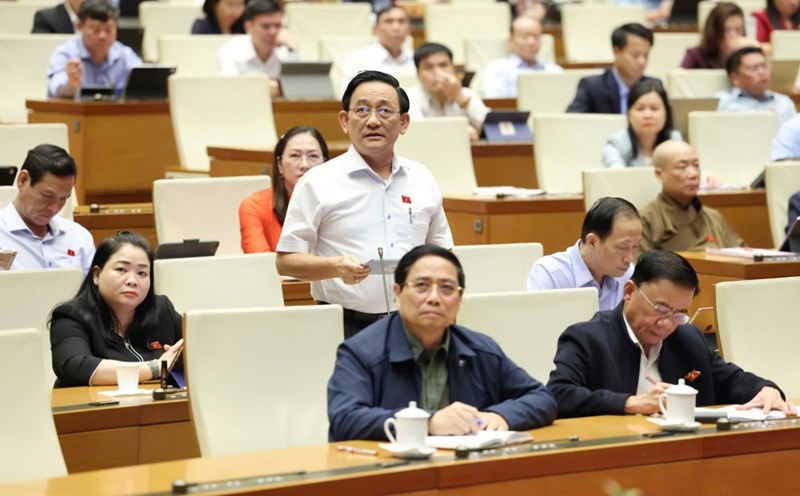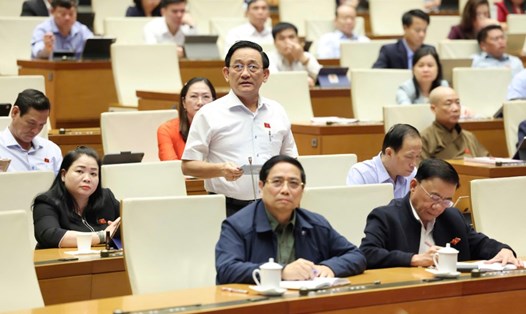Having to borrow money to pay for children's tuition
After nearly 5 years of working as a civil servant in the field of Culture - Society in a ward in Lao Cai province, Ms. Nguyen Thi Mai (character's name has been changed) currently has a salary of about 7 million VND/month.
With this income, Ms. Mai said that she has to spend sparingly to maintain a minimum living standard, especially in the context of sharp price increases in recent times.
She shared that her monthly rent and living expenses alone are nearly 6 million VND. The two children are in kindergarten, the cost of boarding education makes it very difficult for the family to cope.
"There were many months when I had to borrow money from friends to pay my child's tuition. My husband's salary as a worker is also unstable, so every expense has to be balanced one by one," she said.
The pressure of work increased after the organizational arrangement, but her income was still stagnant, making Ms. Mai feel sad.
From her own situation, Ms. Mai suggested that the State soon adjust the basic salary from January 1, 2026. According to her, salary increases not only help reduce the burden of spending but also create motivation for civil servants to work with peace of mind, especially in specific fields such as culture, healthcare, and education.
"I do not demand much, I just hope the salary is enough to maintain my life and raise my children to study. Officials are also workers, only when life is less difficult can we wholeheartedly work to serve the people" - Ms. Mai shared.
Meanwhile, Ms. La Thi Hong (39 years old, residing in Lao Cai province) expressed that since the merger, each individual who is an employee or specialist at the commune and ward levels has had to work with high intensity, day and night, on average handling 1,500 - 2,000 records per month.
However, their salary only ranges from an average of 7-8 million VND/month. Ms. Hong proposed to increase salaries for cadres and employees at the commune and ward levels, commensurate with the current workload.
Ms. Mai and Ms. Hong are just 2 of many cadres, civil servants and public employees who continue to stay attached to the public sector after the recent staff streamlining. They hope to have an income worthy of their efforts, to continue to maintain their motivation to work, serve the people and stay in the profession for a long time.
Avoid the situation of good human resources leaving the public sector
Dr. Doan Van Tinh - Deputy Head of the Department of Human Resources Management at the Academy of Public Administration and Management - assessed that the Government's orientation on restructuring commune-level human resources demonstrates a strategic and synchronous approach, focusing on two pillars: "Stream" personnel that do not meet requirements and "build" a high-quality team.
The "streamlining" pillar is realized through a general review, assessment, and classification of commune-level cadres and civil servants, while applying a new mechanism for evaluating the effectiveness of activities with qualitative criteria (KPI) as an objective basis for the arrangement and resignation.
However, to ensure the sustainable success of the "team building" strategy, Mr. Tinh said that breakthrough solutions are needed to overcome the fundamental barrier of the salary regime.
"Salary reform must be considered a strategic lever for the quality of public personnel, with a specific roadmap to adjust the salary and allowance regime for commune-level civil servants, especially in areas with high workload and complexity.
If income is not attractive enough, the situation of good human resources leaving the public sector will continue to occur, making it difficult to effectively attract and retain talented people" - the expert emphasized.
According to Minister of Home Affairs Do Thanh Binh, there are currently 136,261 cadres and civil servants (government) working in 3,321 communes, wards and special zones. On average, 41 people/commune level, of which 94.6% of cadres and civil servants have qualifications and expertise suitable for their job position; 6,182 people (5.4%) have not met the requirements for expertise and profession.











